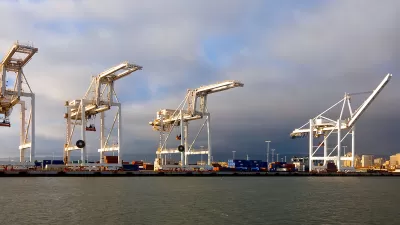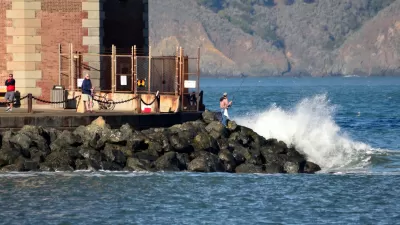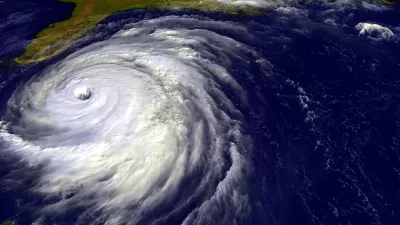Income inequality, housing affordability, and systemic racism join sea-level rise as key issues in Oakland's vision for urban resilience.

Like many resilience strategies, the Resilient Oakland Playbook outlines plans to prepare aging infrastructure for the drought conditions, increased wildfires, and sea-level rise that will likely impact the California city in the coming years.
But while climate impacts might be where some plans stop, Oakland has taken the approach that social and racial equity, an inclusive economy, and citizen empowerment are also crucial to the city’s overall sustainability.
"Our greatest barriers to resiliency are addressing our day-to-day social stresses, including equitable access to quality jobs, education, affordable housing, community safety and better infrastructure," Chief Resiliency Officer Kiran Jain told Next City.
Oakland does address these problems individually: The city has a goal of producing zero waste by 2020. It has taken steps to tackle its housing crisis, and recently launched its first Department of Transportation, which will take a complete streets approach to transportation planning. The state is also developing a regional plan to address sea-level rise in the Bay Area. The new "playbook" serves to connect separate departments under a common framework.
It is an element of the city’s participation in the Rockefeller Foundation’s 100 Resilient Cities (100RC) program, which provides cities worldwide technical support and funding for resiliency programs. Oakland hired its first chief resiliency officer through 100RC in 2014.
FULL STORY: Oakland Publishes Playbook for a Resilient Future

Alabama: Trump Terminates Settlements for Black Communities Harmed By Raw Sewage
Trump deemed the landmark civil rights agreement “illegal DEI and environmental justice policy.”

Study: Maui’s Plan to Convert Vacation Rentals to Long-Term Housing Could Cause Nearly $1 Billion Economic Loss
The plan would reduce visitor accommodation by 25% resulting in 1,900 jobs lost.

Planetizen Federal Action Tracker
A weekly monitor of how Trump’s orders and actions are impacting planners and planning in America.

Waymo Gets Permission to Map SF’s Market Street
If allowed to operate on the traffic-restricted street, Waymo’s autonomous taxis would have a leg up over ride-hailing competitors — and counter the city’s efforts to grow bike and pedestrian on the thoroughfare.

Parklet Symposium Highlights the Success of Shared Spaces
Parklets got a boost during the Covid-19 pandemic, when the concept was translated to outdoor dining programs that offered restaurants a lifeline during the shutdown.

Federal Homelessness Agency Places Entire Staff on Leave
The U.S. Interagency Council on Homelessness is the only federal agency dedicated to preventing and ending homelessness.
Urban Design for Planners 1: Software Tools
This six-course series explores essential urban design concepts using open source software and equips planners with the tools they need to participate fully in the urban design process.
Planning for Universal Design
Learn the tools for implementing Universal Design in planning regulations.
Caltrans
Smith Gee Studio
Institute for Housing and Urban Development Studies (IHS)
City of Grandview
Harvard GSD Executive Education
Toledo-Lucas County Plan Commissions
Salt Lake City
NYU Wagner Graduate School of Public Service




























